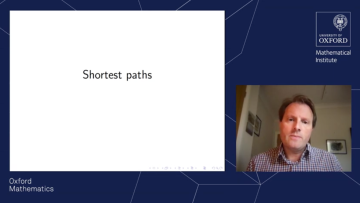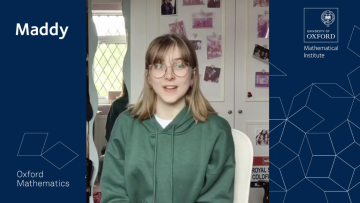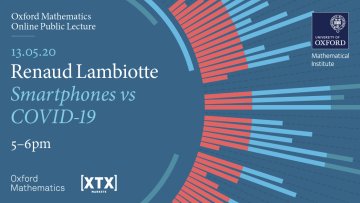Like many Universities around the world, Oxford has gone online for lockdown and that has included our undergraduate lectures. Normally delivered in packed lecture halls by a lecturer and a whiteboard (sadly blackboards are now emiriti), we have had to rapidly adjust to an online substitute. So how do they look?
Lockdown hasn't stopped our Oxford Mathematics Open Days. And it hasn't stopped hundreds of prospective students attending and asking questions as we all met up online. In fact we received over 500 questions on the two recent Open Days (April 25 and May 2) so we thought we would pull out the most popular and make a short film of answers.
On differing derived enhancements
Abstract
In this talk I will briefly sketch the philosophy and methods in which derived enhancements of classical moduli problems are produced. I will then discuss the character variety and distinguish two of its enhancements; one of these will represent a derived moduli stack for local systems. Lastly, I will mention how variations of this moduli space have been represented in number theoretic and rigid analytic contexts.
Oxford Mathematics Online Public Lecture
Renaud Lambiotte - Smartphones vs COVID-19
Wednesday 13 May 2020
5.00-6.00pm
For several weeks news media has been full of how contact tracing Smartphone apps could help fight COVID-19. However, mobile phones can do more than just trace - they are vital tools in the measurement, prediction and control of the virus.
Graph Filtrations with Spectral Wavelet Signatures
Abstract
We present a recipe for constructing filter functions on graphs with parameters that can optimised by gradient descent. This recipe, based on graph Laplacians and spectral wavelet signatures, do not require additional data to be defined on vertices. This allows any graph to be assigned a customised filter function for persistent homology computations and data science applications, such as graph classification. We show experimental evidence that this recipe has desirable properties for optimisation and machine learning pipelines that factors through persistent homology.
From dynamics to combinatorics and back again
Abstract
The last fifty years of dynamical systems theory have established that dynamical systems can exhibit extremely complex behavior with respect to both the system variables (chaos theory) and parameters (bifurcation theory). Such complex behavior found in theoretical work must be reconciled with the capabilities of the current technologies available for applications. For example, in the case of modelling biological phenomena, measurements may be of limited precision, parameters are rarely known exactly and nonlinearities often cannot be derived from first principles.
The contrast between the richness of dynamical systems and the imprecise nature of available modeling tools suggests that we should not take models too seriously. Stating this a bit more formally, it suggests that extracting features which are robust over a range of parameter values is more important than an understanding of the fine structure at some particular parameter.
The goal of this talk is to present a high-level introduction/overview of computational Conley-Morse theory, a rigorous computational approach for understanding the global dynamics of complex systems. This introduction will wander through dynamical systems theory, algebraic topology, combinatorics and end in game theory.
Local stochastic volatility and the inverse of the Markovian projection
Abstract
Abstract: The calibration problem for local stochastic volatility models leads to two-dimensional stochastic differential equations of McKean-Vlasov type. In these equations, the conditional distribution of the second component of the solution given the first enters the equation for the first component of the solution. While such equations enjoy frequent application in the financial industry, their mathematical analysis poses a major challenge. I will explain how to prove the strong existence of stationary solutions for these equations, as well as the strong uniqueness in an important special case. Based on joint work with Daniel Lacker and Jiacheng Zhang.




